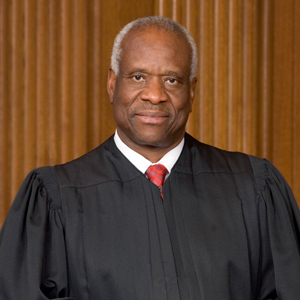Justice Thomas argues for repeal of doctrine protecting military from tort suits incident to service

U.S. Supreme Court Justice Clarence Thomas.
U.S. Supreme Court Justice Clarence Thomas argued Monday that the high court should have agreed to hear an appeal by a West Point cadet to repeal a doctrine that has protected the military from tort lawsuits by service members outside combat.
In a dissent from cert denial, Thomas said the doctrine established in 1950 by Feres v. United States was a policy judgment by the Supreme Court that is not based on the wording of the Federal Tort Claims Act.
The law has a narrow carve-out that only protects the government from suits “arising out of … combatant activities … during time of war.” Feres goes further by protecting the United States from suits incident to military service.
The “Jane Doe” petitioner was a student at the U.S. Military Academy at West Point who said she was raped by a fellow cadet. Her suit alleged that West Point’s sexual assault policies were inadequate. A federal appeals court held that Doe’s claims were barred by sovereign immunity.
“Feres was wrongly decided; and this case was wrongly decided as a result,” Thomas said.
Under the plain text of the tort law, Doe should have been allowed to sue, Thomas said.
“Under our precedent,” Thomas wrote, “if two Pentagon employees—one civilian and one a service member—are hit by a bus in the Pentagon parking lot and sue, it may be that only the civilian would have a chance to litigate his claim on the merits.”
Thomas said lower courts are “understandably confused” about what counts as an injury incident to military service.
“At a minimum, we should take up this case to clarify the scope of the immunity we have created,” Thomas wrote.
The case is Doe v. United States.
Write a letter to the editor, share a story tip or update, or report an error.


